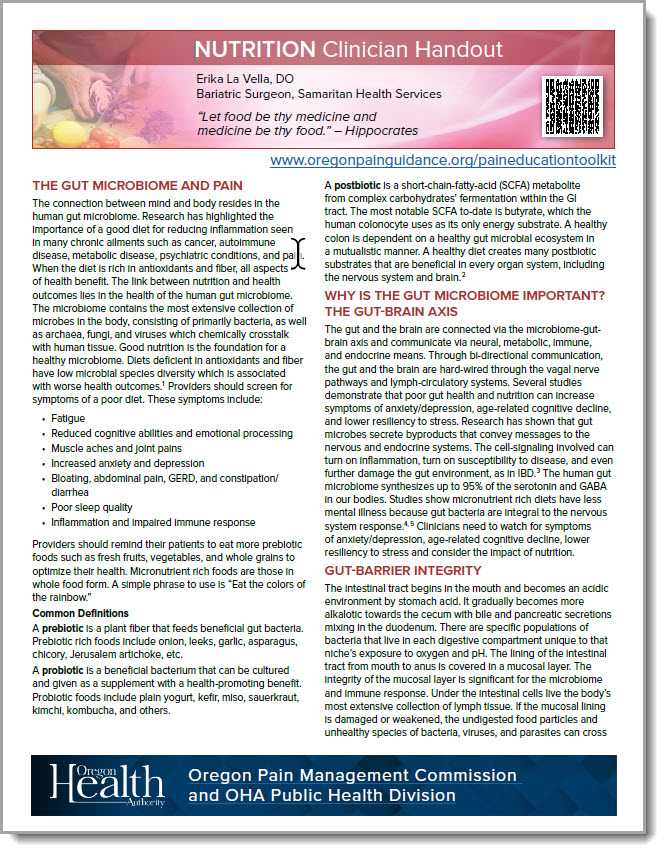NUTRITION, STRESS AND PAIN ARE DIRECTLY RELATED
When our brain and body are stressed, we do not digest food very well, even with a healthy diet. This can cause diarrhea or constipation and add to pain. Good nutrition will improve your gut health and change your experience with pain.
A HEALTHY LIFESTYLE HELPS YOUR PAIN
If your patients make healthy food choices, prepare food at home, and eat with friends and family in a relaxed environment, many of their digestion problems are likely to improve. Restful sleep, regular activity, and a good social life can also help with pain.
 VIDEO
VIDEO
The Nutrition video has four sections:
- Common symptoms of nutritional or gut health problems
- Why gut health is important for pain management
- Lifestyle tips for better nutritional or gut health
- Goal Setting
The video contains all the educational content, so be sure to have the patient watch the entire video.
 HANDOUT
HANDOUT
Download the handout to learn about:
- The Gut Microbiome and Pain
- Why the Gut Microbiome is Important: The Gut-Brain Axis
- Gut-Barrier Integrity
- How the Gut Microbiome can be Disrupted
- the Effect of Antibiotics
 RESOURCES
RESOURCES
- Lynch SV, Pedersen O. The human intestinal microbiome in health and disease. New England Journal of Medicine. 2016 Dec 15;375(24):2369-79.
- Peluzio MD, Martinez JA, Milagro FI. Postbiotics: Metabolites and mechanisms involved in microbiota-host interactions. Trends in Food Science & Technology. 2020
Dec 10. - Carabotti M, Scirocco A, Maselli MA, Severi C. The gutbrain axis: interactions between enteric microbiota, central and enteric nervous systems. Annals of Gastroenterology:
quarterly publication of the Hellenic Society of Gastroenterology. 2015 Apr;28(2):203. - Hibberd MC, Wu M, Rodionov DA, Li X, Cheng J, Griffin NW, Barratt MJ, Giannone RJ, Hettich RL, Osterman AL, Gordon JI. The effects of micronutrient deficiencies on
bacterial species from the human gut microbiota. Science translational medicine. 2017 May 17;9(390):eaal4069. - Rogers GB, Keating DJ, Young RL, Wong ML, Licinio J, Wesselingh S. From gut dysbiosis to altered brain function and mental illness: mechanisms and pathways. Molecular
psychiatry. 2016 Jun;21(6):738-48. - Guo R, Chen LH, Xing C, Liu T. Pain regulation by gut microbiota: molecular mechanisms and therapeutic potential. British journal of anaesthesia. 2019 Nov 1;123(5):637-54.
- Imhann F, Bonder MJ, Vila AV, Fu J, Mujagic Z, Vork L, Tigchelaar EF, Jankipersadsing SA, Cenit MC, Harmsen HJ, Dijkstra G. Proton pump inhibitors affect the gut
microbiome. Gut. 2016 May 1;65(5):740-8. - Syer SD, Wallace JL. Environmental and NSAIDenteropathy: dysbiosis as a common factor. Current gastroenterology reports. 2014 Mar 1;16(3):377.
- Kempuraj D, Mentor S, Thangavel R, Ahmed ME, Selvakumar GP, Raikwar SP, Dubova I, Zaheer S, Iyer SS, Zaheer A. Mast cells in stress, pain, blood-brain barrier,
neuroinflammation and Alzheimer’s disease. Frontiers in cellular neuroscience. 2019 Feb 19;13:54. - Iizumi T, Battaglia T, Ruiz V, Perez GI. Gut microbiome and antibiotics. Archives of medical research. 2017 Nov 1;48(8):727-34.


